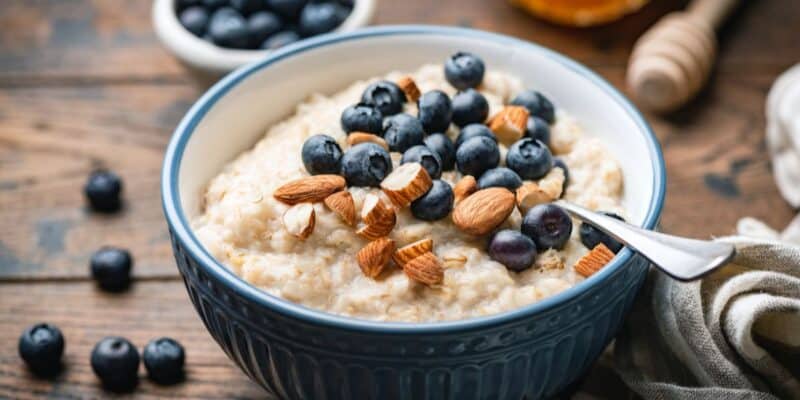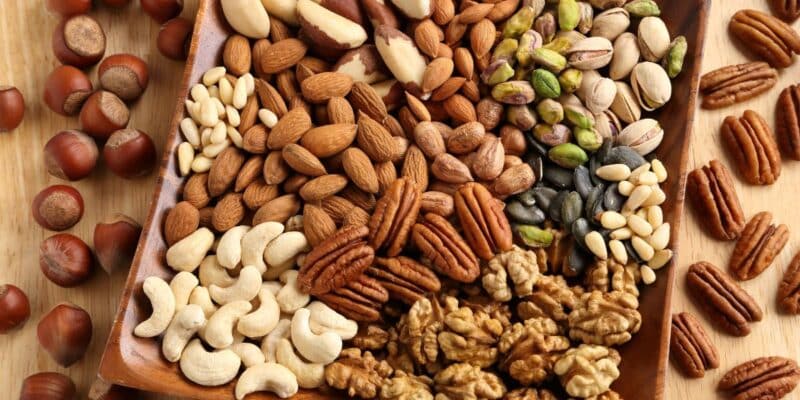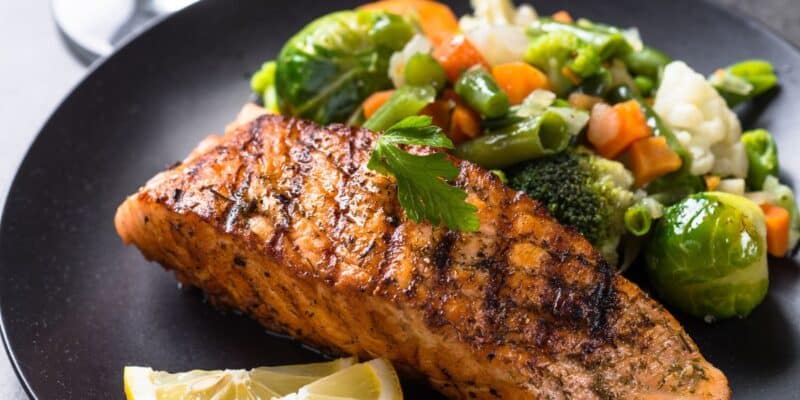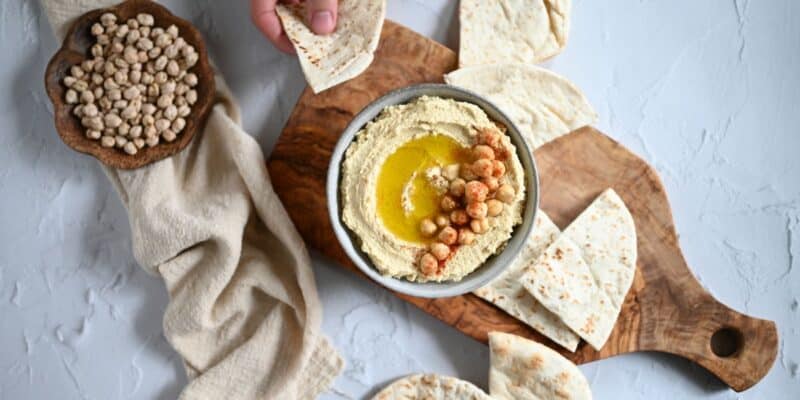Breastfeeding works on a simple supply and demand principle.
There may be times, however, that you feel that you need to increase breast milk supply fast, perhaps during a baby’s growth spurt, If you are pumping at work or if your baby is unable to breastfeed.
Many foods are available which are known to help to increase breast milk naturally gently.
Some of these lactogenic foods have been used for centuries in many different cultures to aid Breastmilk supply
Very limited scientific research if any is available, to prove the claims that these foods will, in fact, increase breast milk and work as a galactagogue.
Many of these foods have been used in some countries for centuries, and many moms believe they helped greatly boost their milk production.
Many moms may have tried these methods with varying degrees of success. Adequate nutrition and hydration are essential for lactating mothers to maintain milk production. There is a growing body of research supporting the role of maternal nutrition in breast milk production and composition.
Mothers of multiple children may find it challenging to prioritize their own nutritional needs while juggling the demands of parenting. However, it is important for lactating mothers to consume adequate and balanced nutrition to support milk production and maintain their own health.
Some strategies that can be put into place to ensure adequate nutrition include meal planning, stocking the kitchen with healthy snacks and easy-to-prepare meals, and enlisting support from partners or other family members.
It may also be helpful to prioritize self-care activities such as taking breaks to eat and hydrate and seeking out community resources for assistance if needed.
By taking steps to prioritize their own nutritional needs, lactating mothers can support their milk production and maintain their overall health and well-being, which can benefit both themselves and their families.
The following foods must be eaten in moderation and as part of a well-balanced diet. Please consult your doctor before taking any herbal or natural supplements.
As an Amazon Associate, I earn from qualifying purchases. The links below may be affiliate links. Please read my disclosure policy for more information.
Breastfeeding is natural but far from easy. Anything that can make breastfeeding easier and help you get on the right track from day one is definitely vital. As a new mom – there is just SO much to know about breastfeeding a baby!
From my experience, it’s a great idea to prepare for breastfeeding by taking, a simple and affordable breastfeeding class. I like the Milkology Course as a certified lactation educator runs it, is video-based, and comes with a troubleshooting guide – that’s important.
1. Oatmeal

Oatmeal is one of the most commonly used foods to increase breast milk supply.
Oats which are commonly eaten at breakfast boasts an abundance of vitamins and nutrients.
This comforting food is also known to reduce stress which always helps increase milk supply.
Oatmeal is such a versatile food, it can not only be made into a porridge but into breakfast bars, biscuits, granola and even made and left overnight as overnight oats.
2. Garlic
Used for centuries garlic is a well-known Galactagogue, it has been used as a natural treatment to help stimulate production and increase the supply of breast milk.
Garlic is most commonly used in food for flavoring, but its medical benefits are also noted in history as anti-inflammatory, anti-bacterial, and anti-parasitic.
It is also known to lower cholesterol and can provide relief from colds and flu.
There is a theory that babies like the taste of garlic. A study in 2018 found that babies nursed more often and drank more milk when the mom took a garlic supplement prior to nursing.
3. Green Papaya
Raw or green papaya is not only delicious but is also known to increase the production of oxytocin the hormone that regulates milk production in a mother’s body.
Green papaya has many health benefits and is a superfood that can increase the quality and quantity of your milk.
It is high in Vitamin A, C, E, K, and folate.
It is one of the richest sources of Vitamin C which will boost your immunity and aid your recovery postpartum.
4. Carrots
Carrots are rich in beta carotene, and due to the abundance of Vitamins, A carrot can increase breast milk supply.
Carrots are a great way of getting Vitamin A into your diet, and you can read about its effects here
You can enjoy carrots in many ways: A soup, steamed, roasted with cumin seeds, a glass of carrot juice and even having it in milk sweetened with honey.
5. Spinach
Spinach is a good calcium, iron, Vitamin K, and folate source. When breastfeeding, your body needs specific vitamins and minerals, and spinach is an excellent source of nutrition.
Dark green leafy vegetables contain phytoestrogens known to promote breast tissue health and lactation; these are plant-based chemicals with properties similar to estrogen.
6. Fenugreek Seeds
Fenugreek (Trigonella foenum-graecum L) Is the most widely used and popular herb used to increase breast milk supply.
Generally, mothers notice an improvement within 48hrs which a very fast method of increasing breast milk supply.
Dosages less then 3500mg per day are reported to have little effect.
Some individuals may use the odor of their urine or sweat as an indicator of taking the appropriate dosage of a supplement, such as fenugreek.
However, relying solely on subjective indicators like odor may not be reliable or recommended. It is important to follow recommended dosages and consult with a healthcare provider or a lactation consultant before taking any supplements to increase milk supply.
One study published in the Clinical Epidemiology and Global Health in 2020, found that lactating mothers who received fenugreek capsules had a significant increase in milk production compared to those who received a placebo.
Taking fenugreek seeds in capsule form is the easiest way to get large doses into your body.
However, in India fenugreek is eaten in curries and used in sweet dishes given to lactating mothers to help boost milk production.
There is, however, some evidence to suggest that a certain population may have their milk supply decrease.
For some moms who struggle with blood sugar regulation post-birth, fenugreek may decrease your supply.
Also, some studies have found that fenugreek has decreased blood sugar in some infants and caused undue gas in infants.
7. Nuts

Nuts are an excellent source of omega 3 fatty acids and proteins. They are a powerhouse of nutrition boasting high amounts of Vitamins K and B they also contain Iron, zinc, and Calcium.
In many parts of the world, nuts are used as lactogenic food, especially almonds.
They have been used and written about extensively in Ayurvedic literature and are widely used as one of the most lactogenic foods available.
Nuts can be eaten alone as a snack, in cookies or even turned into milk for those who experience an allergy to dairy.
8. Fennel Seeds
Typically, Fennel seeds are used as an herb for cooking, it is more commonly used for digestive issues, menstrual problems and for increasing the production of milk in lactating women.
One reason why it may work for some women is that it has estrogen-like properties.
Taking fennel can also help colic in young babies; the active ingredients can pass through the mother’s breastmilk giving the baby some relief from the pain caused by gas.
9. Black Sesame Seeds
Black sesame seeds are known to increase breast milk supply. They are a rich source of Calcium and omega-6 fatty acids.
Most commonly used in curries, they can be blended into smoothies or just scattered over a salad.
10. Barley
Barley is not only a great galactagogue but keeps you well hydrated. Barley is a base commonly used in lactation teas; however, it can be made into a comforting porridge or a delicious soup.
Barley water is another excellent way of keeping hydrated, and drinking it throughout the day could encourage breast milk production.
11. Asparagus
Some consider asparagus to be a must-have food in a lactating mom’s diet. High in Vitamin K and A it’s also high in fiber.
It is a food that stimulates milk-producing hormones in breastfeeding mothers and is essential for lactation.
It is a wonderful accompaniment to most dishes, it can be added to smoothies and even made into a tea.
You may find however that your baby’s urine may smell of it once it has been consumed, some mothers also report that some babies do not like the taste when it gets into the milk.
12. Brown Rice
High in carbohydrates, most moms will shy away from eating brown rice.
It is, however, both nutritious and can help stimulate breast milk production.
Brown rice is known to stimulate the hormones responsible for milk production, and these healthy whole grain carbs will give you lots of energy and contribute to your recovery postpartum as part of a healthy balanced diet.
13. Apricots
Apricots are a great way of getting Vitamin A and C into the body as well as calcium and potassium.
Apricots also contain Phytoestrogens, mimicking what estrogen does in the body. Phytoestrogens help the milk-producing hormones in the body thus increasing lactation.
Apricots can be eaten fresh when they are in season in the summer or as a dry fruit snack in the winter.
14. Salmon

A rich source of Vitamin B12 and omega 3 fatty acids. Salmon is also a natural source of Vitamin D.
The large amounts of DHA found in salmon are excellent for developing the baby’s nervous system and brain.
These essential fatty acids will improve lactation and help with the quality of your milk.
Salmon can be grilled, fried or steamed and is delicious with a squeeze of lemon.
15. Cumin Seeds
Cumin seeds can help boost lactation but need to be eaten in moderation. They can help with digestive issues and are sometimes used to burn fat.
Customarily used to spice food, you can take a pinch with a glass of water to help your milk supply.
16. Holy Basil
Holy Basil or Tulsi is a type of herb that is commonly used in traditional Ayurvedic medicine.
It is native to India, where it has been used for centuries for its medicinal properties. has been used for centuries as an aid for lactating moms.
Best known for its calming effect it can also help boost breast milk production, help with digestion, relieve constipation and promote a healthy appetite.
Holy Basil is commonly taken as a tea aiding relaxation.
17. Dill Leaves
Dill is known to be a lactogenic herb. It can be added to food to spice it up or as a calming tea.
18. Spirulina
A breastfeeding mother can take spirulina .
Spirulina is a superfood that has a lot of benefits for our bodies. It supplies vitamins, antioxidants, protein, and good fats.
Please consult your doctor if you are considering trying it as there have been some recent concerns regarding its safety.
19. Bottle Gourd
Bottle and bitter gourd are excellent sources of vitamins and minerals and are used to increase breastmilk in moms.
20. Sweet Potato
An excellent source of vitamin A, carotenoids and potassium.
A small potato contains the recommended amount of vitamin A needed in a whole day! It is an old wives’ tale that this vegetable is a galactagogue and there is no scientific data to back this claim.
However, some women find it does in fact help increase breast milk supply.
21. Chickpeas

Chickpeas are part of the legume family; they provide 20% of your daily intake of protein.
They are a powerhouse of nutrients such as folate, fiber, iron, phosphorus, thiamine, Vitamin B6, magnesium, and Zinc.
Due to its high protein content, they are known to be a great galactagogue, improving the quality and quantity of your milk.
Chickpeas are a great snack eaten alone or combined with garlic, another great galactagogue, tahini, and olive oil can make lovely humus.
22. Poppy Seeds
Poppy seeds can be used to help you be calmer and more relaxed. The more relaxed you are the more breast milk you will produce.
I found that poppy seeds were a great addition to my lactation cookies, if you are a baker you can use them to garnish bread.
23. Cow’s Milk
According to some cultures cows, milk can help increase breast milk supply as it will help hydrate you.
In some cultures, it is customary for a new mom to drink a large glass of milk with ground nuts sweetened with honey to help boost milk.
It can also aid constipation in the early days postpartum.
24. Fat
Breast milk is approximately 50% fat because it is needed for a baby to develop its nervous system and brain.
Gamma lineic acid (GLA) is a vital fat needed to help quickly build brain and nervous system cells.
Breast milk is one of the richest sources of GLA. Fat is rich in calories.
Olive oil, coconut oil and ghee are excellent sources of good fats.
25. Brewer’s Yeast
Another traditional tale is that brewers yeast works to increase milk supply.
A highly nutritious supplement full of vitamins and minerals and commonly used for baking, brewing beer and making wine.
Anecdotal evidence does suggest it is a good supplement to try and many women report having huge success with it.
However, some also report not seeing much change at all.
If you decide to try the B vitamins, protein and iron may help to ward off any fatigue and help if you suffer from baby blues.
26. Moringa
Moringa known as the miracle tree is known as a super food in many cultures.
It is well known for its ability to increase breast milk in nursing mothers.
It is also known to be
27. Dates
Aside from being a delicious fruit, dates support and nourish the blood helping milk production and lactation.
You can enjoy them fresh, dried, in soups and as part of a lactation cookie for double the power.
28. Protein
Protein is used by the body to produce breast milk and is a vital element of breast milk.
Therefore it is important that you eat lots of protein to help build and maintain your milk supply, ultimately helping your baby’s development and growth.
You can get a good amount from dark green leafy veggies, and nuts if you are vegetarian. Beef, lamb, soy, fish, and chicken for those that aren’t vegetarian
29. Drink Fluids

A common belief is the more you drink, the more you produce however this may not be the case.
It may be caused by a reduction of fluids or the fact that you may be dehydrated.
If you are dehydrated there may well be a chance that your baby is too due to limited supply of milk that he needs.
A sign that you may be suffering from dehydration is your milk supply might decrease.
You’ll notice that your breasts don’t feel as full of milk as usual. After the initial engorgement after a baby is born, when your body develops an ample supply of milk, your body adjusts.
Some moms never regain that fullness in their breast tissue, have softer breasts, but are able to feed their baby adequately.
You might develop cramps in your muscles while you hold your baby as he nurses.
Cramps could be a late sign of dehydration, but most everyone begins with thirst, then fatigue, before muscle cramps set in.
Leg cramps after birth could be a missed blood clot in the medical world.
If mom is cramping over her whole body, days after birth, that could be the birth experience causing muscle fatigue, sometimes misunderstood as cramping, or as explained dehydration.
30. Nursing Tea
A nursing tea is a great way to combine several galactagogues in one cup rather than taking each supplement, herb or food on its own.
It’s also a good way of staying hydrated and away from the inevitable 8 cups of coffee most moms want to drink.
Some women find teas Lactation teas to have a strong taste. They almost always have fenugreek in them, which for women who struggle with low blood sugar; this could be a concern.
Most women need to drink 6+ cups/day to see a difference in their supply; if it works.
31. Goats Rue
Goats rue is part of the legume family, It is often used for those with insufficient glandular tissue.
Goats rue is commonly used alongside fenugreek and alfalfa as a way of increasing breast milk supply.
The easiest way to take this is in a capsule form.
32. Lactation Cookies
Lactation cookies are a great way of combining lots of ingredients that encourage breast milk to increase.
Using oats as a base you can add as many nuts, dried fruit and seeds as you wish.
They make a great nutritious snack to have whilst you are feeding or if you a feeling a tad peckish.
If you are not feeling up to baking there are so many tasty ones available to purchase in lots of flavors.
Lactation cookies with blessed thistle
Lactation cookies mix where you can add your own ingredients
A word of caution. Those struggling with blood sugar instability, the high sugar content in lactation cookies can decrease some moms’ supply, not increase it.
For those that don’t have an increased supply with fenugreek, I would steer away from high sugar content lactation cookies.
33. Avocado
Avocado is normally considered a vegetable when it is indeed a fruit.
Avocados are full of potassium, amino acids, and protein. They are a healthy source of fat.
The high amounts id monounsaturated fats that avocados contain will help your body absorb fat-soluble vitamins such as K, A, E and D.
Avocados are also a great way of getting DHA an essential omega-3 fatty acid, which helps baby’s brain development.
Avocados provide 40% of your daily fiber needs, it will help aid digestion and prevent constipation.
Avocado is a great snack eaten as it is, in guacamole or just mashed on some toast.
34. Dandelion
Used in Chinese and Native American medicine, those little flowers in your backyard may help boost your milk supply.
They have been used for centuries to aid recovery after birth and to help stimulate breast milk.
The dandelion flower is all edible even its stalks and leaves so you can have it in a soup or as a side with your main meal or even enjoy a cup of dandelion tea.
35. Alfalfa
Alfalfa is technically a pea abundant in Vitamins, Minerals and amino acids. It is known to help boost milk supply. The best way to eat it is in a salad or sandwich.
36. Blessed Thistle
Blessed thistle is an herb typically used in conjunction with fenugreek as a potent galactagogue and is part of many commercially produced lactation teas and cookies for this reason.
The most common way to take this herb is in tea or a capsule.
Anti-Lactogenic Foods

There are also foods that one should stay away from whilst breastfeeding. The foods and drinks that may reduce your milk supply.
A small amount of the following foods are something not to worry about however in large doses may be problematic.
1. Parsley is a diuretic
2. Spearmint and peppermint can adversely affect your milk supply
3. Sage and oregano in large doses can affect your supply and sage tea is a common remedy for oversupply.
4. Applying cabbage leaves to relieve engorgement can be problematic if overused and reduce milk supply.
5. Alcohol will relax you, but it will also relax your milk production. Alcohol is also known to be dehydrating after the 2nd alcoholic drink.
There is no recommended amount. Every person metabolizes alcohol differently. So for one mom, 1/2 glass wine can decrease supply. Most likely, women can tolerate up to two alcoholic drinks before the supply decreases.
6. Decongestants such as pseudoephedrine are known to impact supply adversely.
7. Lemon balm
8. Caffeine can cause dehydration. Try to limit the amount of tea and coffee consumed during the day (easier said than done right?)
The Last Word From Jerilyn IBCBC
I am a proponet of allowing moms to do what is right for them.
The many lists of eat this but not that, puts possible barriers on moms; that they wouldn’t otherwise have.
Some moms will have cultural norms during their breastfeeding journey. Others will rely on “experts” to define what is correct for them.
Finding the right path for each mom is a journey in their breastfeeding journey. And finding what works for them individually is a process, and not a manuel for breastfeeding success.
